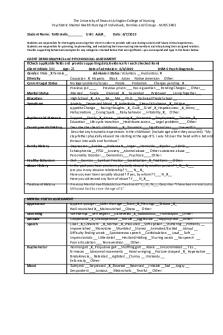Impaired-Urinary-Elimination A nursing care plan PDF

| Title | Impaired-Urinary-Elimination A nursing care plan |
|---|---|
| Course | Bs Nursing |
| Institution | Tarlac State University |
| Pages | 2 |
| File Size | 89.9 KB |
| File Type | |
| Total Downloads | 25 |
| Total Views | 144 |
Summary
A comprehensive nursing care plan for impaired urinary elimination...
Description
Nursing Care Plan IMPAIRED URINARY ELIMINATION RELATED TO URINARY INCONTINENCE AS EVIDENCED BY EXTREME WEAKNESS ASSESSMENT SUBJECTIVE DATA: N/A Objective Data: weak in appearance dehydrated Vital signs BP: 110/70mmHg Temp: 38°C RR: 118
NURSING DIAGNOSIS Impaired urinary elimination related to urinary incontinence as evidenced by extreme weakness
PLANNING Short term: Within 4-6 hours of nursing intervention, the patient will be able to:
verbalize understanding of the condition demonstrate improvement in urine elimination as evidenced by fewer episodes of incontinence improve sense of energy.
Long term: Within 2-3 days of nursing intervention, the patient will be able to:
return of normal voiding pattern as evidenced by no episodes of incontinence and improved urine elimination
IMPLEMENTATION
RATIONALE
INDEPENDENT: Perform a focused history of the incontinence including duration, frequency, and severity of leakage episodes, and alleviating and aggravating factors.
The history provides clues to the causes, the severity of the condition, and its management.
Monitor urinary elimination, including consistency, odor, volume, and color.
These parameters help determine adequacy of urinary tract function.
Monitor vital and cognitive signs, watching for change in blood pressure and respiratory rate.
To establish baseline data and check for the patient’s improvement of condition.
Monitor the patient’s daily fluid intake and output
To help determine of hydration.
Limit ingestion of bladder irritants (e.g., colas, coffee, tea, alcohol, and chocolate)
Alcohol, coffee, and tea have a natural diuretic effect and a bladder irritant.
Emphasize importance of having good perineal hygiene.
To reduce the risk of infection.
Encourage the patient to eat food that is high in fiber (beans, broccoli, and whole grains)
To regulate your bowel movements and overflow incontinence.
EVALUATION Short term: Within 4-6 hours of nursing intervention, the patient will be able to:
verbalize understanding of the condition demonstrate improvement in urine elimination as evidenced by fewer episodes of incontinence improve sense of energy.
Long term: Within 2-3 days of nursing intervention, the patient will be able to:
return of normal voiding pattern as evidenced by no episodes of incontinence and improved urine elimination
Goal was met.
Dependent: Administer IV fluid such as PNSS on fast drip as prescribed.
By regulating the amount of sodium, the kidney can regulate the volume of body fluids.
Administer other medications such as antibiotics.
To treat underlying condition.
Catheterize when and as indicated:
Catheterization can at times be required for evaluation or treatment when a patient retains urine or unable to empty the bladder.
Collaborative: Review for laboratory test for changes in renal function. Report to physician if there is no any improvement on patient’s condition
To assess for contributing or causative factors. Collaboration with specialists helps develop an individual plan of care to meet patient’s specific needs using the latest techniques, continence products....
Similar Free PDFs

N101L Care Plan - Nursing Care Plan
- 11 Pages

Nursing-Care-Plan Example
- 12 Pages

Nursing Care Plan. 2
- 2 Pages

Care plan for nursing
- 1 Pages

Nursing Care Plan Activity
- 2 Pages

Nursing Care Plan- mobility
- 2 Pages

65209370 Nursing Care Plan
- 31 Pages

Nursing care plan
- 2 Pages

Nursing Care Plan
- 2 Pages

Nursing Care Plan Dehydration
- 2 Pages

Nursing CARE PLAN Psych
- 2 Pages

Nursing care plan
- 24 Pages

Clinical Nursing Care Plan
- 3 Pages
Popular Institutions
- Tinajero National High School - Annex
- Politeknik Caltex Riau
- Yokohama City University
- SGT University
- University of Al-Qadisiyah
- Divine Word College of Vigan
- Techniek College Rotterdam
- Universidade de Santiago
- Universiti Teknologi MARA Cawangan Johor Kampus Pasir Gudang
- Poltekkes Kemenkes Yogyakarta
- Baguio City National High School
- Colegio san marcos
- preparatoria uno
- Centro de Bachillerato Tecnológico Industrial y de Servicios No. 107
- Dalian Maritime University
- Quang Trung Secondary School
- Colegio Tecnológico en Informática
- Corporación Regional de Educación Superior
- Grupo CEDVA
- Dar Al Uloom University
- Centro de Estudios Preuniversitarios de la Universidad Nacional de Ingeniería
- 上智大学
- Aakash International School, Nuna Majara
- San Felipe Neri Catholic School
- Kang Chiao International School - New Taipei City
- Misamis Occidental National High School
- Institución Educativa Escuela Normal Juan Ladrilleros
- Kolehiyo ng Pantukan
- Batanes State College
- Instituto Continental
- Sekolah Menengah Kejuruan Kesehatan Kaltara (Tarakan)
- Colegio de La Inmaculada Concepcion - Cebu


